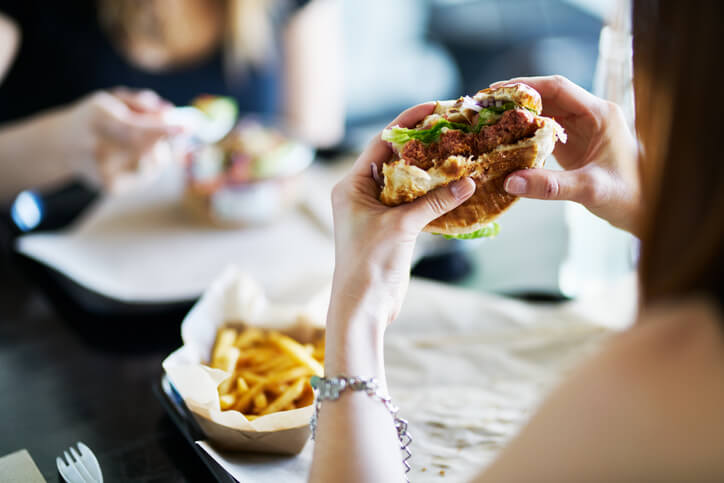New Law Makes NY Restaurants Safer for People With Food Allergies
It just got a little bit safer for New Yorkers with food allergies to eat out.
A new state law, which took effect on May 20, 2023, requires restaurants, food service establishments, and online food ordering services to post a food allergy awareness notice in a location that’s visible to employees. The notice includes procedures for staff to follow when a customer shares that they have a food allergy, how to prevent cross-contamination during food preparation and service, and the instruction to call 911 if a customer has an allergic reaction. Establishments must also include a notice on their menus instructing customers to notify them of any food allergies.
About 1 in 10 people are allergic to one or more foods, according to FARE (Food Allergy Research and Education), a national nonprofit advocacy organization that also funds food allergy research. For some people, ingesting even a minuscule amount of the allergen can cause anaphylaxis, an acute allergic reaction.
Symptoms of anaphylaxis, which can be fatal, can include swelling of the mouth, throat or tongue; breathing or swallowing difficulties; a rash; nausea and vomiting; and unconsciousness. A study published on JAMA Network Open found that 51.1% of food-allergic adults reported experiencing at least one severe reaction.
Dining out can be a minefield for people with food allergies, and it’s an important area of focus for FARE’s advocacy efforts.
“This law is a very good first step to protect the nearly 2 million New Yorkers with food allergies,” says Jason Linde, senior vice president of advocacy at FARE. “It lowers the risks our families face not only in restaurants, but also with online food services and grocery stores that sell prepared foods.”
The law will “help spread awareness to waitstaff and restaurant employees that food allergies are serious, while giving them important information about how to help keep their patrons safe,” says Jill Mindlin, a food allergy parent and advocate who lives in Port Washington. “Until there is a cure for food allergies, education is key.”
But there’s still a long way to go. Currently, New York State does not require restaurants and food service establishments to provide food allergy training to staff, and knowledge and attitudes about allergies and procedures to prevent cross-contamination vary widely among restaurants and staffs.
“We need a statewide restaurant training bill, which exists in Massachusetts and Rhode Island,” says Linde. “Nassau and Westchester counties have passed training bills, but this patchwork approach is leaving many people across the state behind.”
Another goal, Linde says, is to require restaurants to label menus to show which of the nine major food allergens are contained in each dish, similar to European Union regulations. The nine major allergens – milk, eggs, fish, crustacean shellfish, tree nuts, peanuts, wheat, soy and sesame – account for more than 90% of food allergies.
Eating out from time to time is a simple pleasure that many Long Islanders take for granted. But for families with food allergies, it’s far from a carefree experience.
“We can’t just spontaneously walk into a restaurant,” says Mindlin, whose daughter has severe allergies to eggs, peanuts, tree nuts, sesame and, until recently, dairy. “We have to call ahead, vet them and check the food allergy reviews online.”
Because of the risks, “many families with food allergies tend to go to the same restaurants that they have found to be allergy-friendly over and over – where everyone from the servers to the chef understands what needs to be done and gives them a level of comfort that the food is prepared safely,” says Punita Ponda, M.D., associate division chief for allergy and immunology at Northwell Health.
Unlike many other serious conditions that can be fatal, “allergic reactions are completely preventable,” says Susan Schuval, M.D., chief of the division of pediatric allergy/immunology at Stony Brook Children’s Hospital. “This new law will help restaurants better serve people with food allergies and help prevent reactions.”
Communication from the person with the food allergy is a vital part of the equation. “People must tell their server right off the bat that they have an allergy and how severe it is to instill in the server that they need to be cautious and check with the kitchen staff and identify the ingredients,” Dr. Schuval says.
When the food arrives, “double-check that it was prepared without the allergen,” says Dr. Ponda. “If you’ve asked all your questions, but the food doesn’t look right, ask to speak to someone knowledgeable, such as the chef.” Dr. Ponda advises patients to be particularly cautious with “sauces, desserts and certain types of restaurants, including bakeries, ice-cream parlors and ethnic food places, where a lot of reactions have been recorded.” Depending on their allergen, people should consider avoiding certain restaurant categories altogether because of the risk of cross-contamination, Dr. Schuval says. For instance, people with severe fish or shellfish allergies should stay away from seafood houses.
At all times, food-allergic people need to carry their EpiPens, as well as other allergy medications such as antihistamine or an inhaler as directed by their doctor, so they will be prepared to follow their allergy action plan in the event of a reaction, Dr. Ponda says.
“People with food allergies should live their lives, but mitigate the risks while they’re living their lives,” she says. “They need to have backup upon backup upon backup.”






























